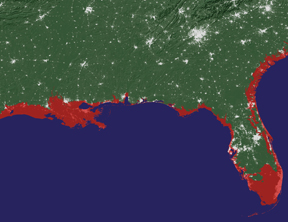
 It won’t
be an apocalyptic Waterworld, but coastlines may be at risk sooner than
previously thought. At current rates of climate change, temperatures at the
poles will increase enough by 2100 to start to substantially melt Earth’s
largest ice sheets, according to two new studies. That melting could ultimately
raise sea levels by more than 6 meters, the researchers say.
It won’t
be an apocalyptic Waterworld, but coastlines may be at risk sooner than
previously thought. At current rates of climate change, temperatures at the
poles will increase enough by 2100 to start to substantially melt Earth’s
largest ice sheets, according to two new studies. That melting could ultimately
raise sea levels by more than 6 meters, the researchers say.
This model shows what would happen to the Gulf Coast of the United States should sea level rise 6 meters, which coral dating suggests occurred 130,000 years ago. Some scientists say that a warmer Earth will trigger large-scale polar melting by 2100, leading to a similar sea-level change. Image is courtesy of Jeremy Weiss and Jonathan Overpeck, University of Arizona.
A warmer world of the past may be the best predictor scientists have for how global warming could trigger ice sheet melting and raise sea levels in the future. Geochemical dating of coral reef tracts off the Florida Keys and Bermuda has suggested that about 130,000 years ago, sea level rose by 4 to 6 meters, kicking off a time period known as the last interglaciation. Earth was between ice ages and it was the last time that summer temperatures in the Arctic were warmer than they are now, largely because Earth was tilted slightly more on its axis than at present and increased levels of solar radiation warmed the Northern Hemisphere in the summertime.
Now, instead of a sharper tilt toward the sun, “greenhouse gas emissions are projected to make Arctic summers as warm or warmer by the year 2100 as they were during the last interglaciation,” says Bette Otto-Bliesner, a paleoclimate modeler at the National Center for Atmospheric Research in Boulder, Colo., and a co-author of one of the papers in the March 24 Science. To estimate how much the ice sheet that currently spans Greenland melted during the last interglaciation, Otto-Bliesner and her team reconstructed the climate of 130,000 years ago.
Temperatures in the Arctic were about 3 degrees Celsius higher at the time, enough to keep parts of Greenland above freezing throughout the summer, Otto-Bliesner says. That warmth led to significant melting of the Greenland ice sheet, which uncovered the southern half of the land mass, but left its central core of ice intact, she says. Over time, that melting resulted in about 2 to 3.5 meters of global sea-level rise, according to her team’s model.
That level falls short of the high water mark recorded by the corals and implies some Antarctic contribution, says paleoclimatologist Jonathan Overpeck of the University of Arizona in Tucson. Because Earth’s Northern Hemisphere received the brunt of solar radiation during the last interglaciation, scientists have generally downplayed the contribution of Antarctic melting to that sea-level rise, he says.
Some data suggest Antarctic melting did occur, however: In an earlier study, researchers analyzing glacial sediments under the West Antarctic Ice Sheet determined that the sheet has shrunk significantly in size in the past (see Geotimes, October 1998). Furthermore, ice cores from eastern Antarctica show that air temperatures were at least 2.5 degrees Celsius warmer during the last interglaciation (see Geotimes, August 2004).
Using the same model as Otto-Bliesner’s team, Overpeck and his team simulated climate conditions on Earth from present day to over the next 140 years. Assuming greenhouse gas emissions continue at current rates, temperatures in Greenland will equal those reached during the last interglaciation by 2100, the model suggests.
Melting in the Arctic would progress similarly, and sea levels could rise as quickly as they did in the past, by 11 millimeters per year. Additionally, small changes in surface ocean water temperatures in the Southern Ocean, combined with the already rising sea levels, could help destabilize the Antarctic Ice Sheet and speed more melting, Overpeck says.
Jim White, a geochemist at the University of Colorado in Boulder, says that the papers draw important attention to sea-level rise, “one of the real ugly problems of the future.” One lingering question, he says, is how soon a tipping point may be reached.
“Sea-level rise is a slow, but hard to stop, train,” White says. Greenhouse gases are already at levels not seen for tens of millions of years, and “even if we stop releasing fossil fuels today, there is still some inertia in the system,” he says. “But if we don’t change our ways, this is where we’re heading.”
Carolyn Gramling
Geotimes contributing writer
Links:
"Ocean temperature changes trigger glacial
melt," Geotimes, October 1998
"Doubling the ice record,"
Geotimes, October 2004
In March and April, torrential rains and melting snows forced the Elbe River over its banks, inundating the town of Hitzacker in Germany, near Hamburg, as shown here (Print Exclusive). The river hit its highest level since 1895, and is threatening many cities and historic towns in Germany.
Across Northern and Eastern Europe, several major rivers are overflowing their banks. Reaching record flood stages at some points, the Danube, Europe’s second longest river, and its tributaries forced many thousands of people from their flooded homes in Romania, Bulgaria, Hungary and Serbia. Villages and farmland in parts of Ukraine, Russia and Austria also have seen massive flooding. The European Space Agency has been monitoring the floods with satellites. Officials have expressed concerns about food shortages and waterborne diseases following the floods, in addition to the numbers of homeless individuals, according to an Associated Press report on April 27.
 |
Geotimes Home | AGI Home | Information Services | Geoscience Education | Public Policy | Programs | Publications | Careers |